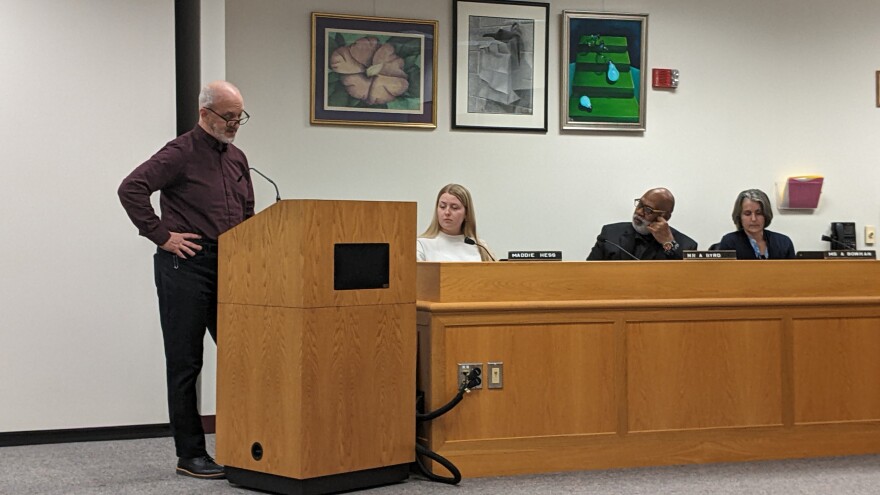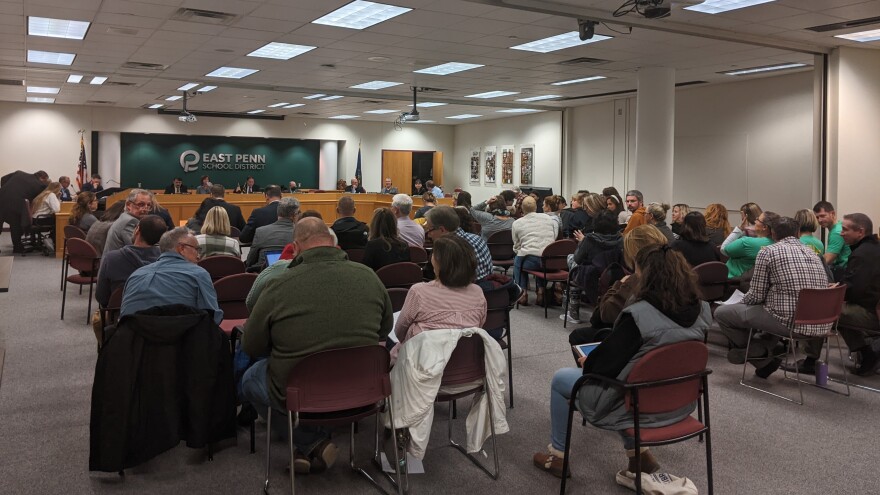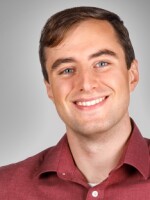EMMAUS, Pa. - Emmaus High School will phase out the general preparatory level of instruction for social studies and English curriculum offerings starting next year, East Penn School Board voted Monday.
- Emmaus High School no longer offers general preparatory track to students, beginning with the ninth-grade class next school year
- The track allows for a slower-paced curriculum, but administrators worry it may hamper students' results
- Teachers and students spoke at the board meeting where the decision was approved, worrying over its impact on both teachers and students
Starting with the ninth-grade class next year, students will have only honors and on-track courses from which to choose.
The three-track option of general preparatory, or GP; college preparatory, or CP; and honors courses will remain for all current high school students who have had the option and will be phased out over the next four years for each grade.
The board's vote was 6-3, with Michael Felegy, Jeffrey Jankowski and Jennifer Bowen voting against the change.
Detracking those subjects will mean students with mixed abilities now will be in the same classes.
Currently, GP sections in English and social studies have around 100 students on average per grade.
"We saw an overrepresentation of specific demographic subgroups in our GP-level courses," East Penn Superintendent Kristen Campbell said.
In theory, Campbell said, the two levels of courses have the same curriculum.
"But recognizing that students in the gap courses have more diverse learning needs, the curriculum has been modified and is taught at a much slower pace," she said. "And so as a result, we have a portion of kids who weren't getting through grade-level curriculum."
Most of the 2023-24 program of studies were adopted unanimously at the board's Nov. 14 meeting. The board tabled the track change for the two subjects for Monday's meeting for further discussion.
Speakers raise concerns
Eight speakers, many who spoke at the prior meeting, addressed the board with concerns about the change in front of the full crowd of attendees that included students, parents, teachers and administrators.
Emmaus High social studies teacher John Gallagher was among eight speakers, including teachers and students. Gallagher said he was excited to see the issue tabled last month in the hopes of getting further feedback and discussion from teachers so that instructors get on board for the change, but was disappointed.
"Since last month, there has been exactly this many attempts to do that — zero," Gallagher told the board.
"No attempts to show us data, no attempts to speak with us regarding the veracity of the data used to make this decision, the effectiveness of the change itself or to see what we do in our classrooms that might be impacted by this change. None.
"If this is such a good idea for our students, why haven't there been any attempts to demonstrate how this is so."

Gallagher said teachers have only been reached out to on how to implement the change, rather than for feedback.
Speaking to the board, student Cyan Kvacky referenced a petition she said had more than 300 students' signatures to keep GP classes in place.
Like many others, I just want to know what the actual plan is all future EHS students.Cyan Kvacky, Student
"Like many others, I just want to know what the actual plan is all future EHS students," Kvacky said. "I want to know what you're doing with students, not to them, and what everyone will have to pick during course selection, like my sister will be a freshman next year.
"Our district is making a knee-jerk decision based off scores that aren't an accurate representation of students' or teachers' performance."
A rushed decision?
There also was concern among some speakers that the decision was being rushed, which was echoed by board Vice President Jankowski, who said his preference would be to roll it out in the 2024-25 school year to ensure the new program is successful.
Some board members spoke on the need to encourage growth and proficiency in students to improve outcomes throughout the district and in underrepresented groups.
That pairs with data presented by high school administrators during the Oct. 24 board meeting that showed that students from a minority background were overrepresented in GP track instruction and that such a change would reduce stigmatizing of lower-ability and segregation based on socioeconomic status and other factors.
"These models have worked in the past, we'd have historical precedent for these models working, which is why I believe it can work here," board member Alisa Bowman said.
When kids are told that they can't achieve, or that when the adults in their life have low expectations of them, the students themselves have low expectations of themselves.Board Member Alisa Bowman
"When kids are told that they can't achieve, or that when the adults in their life have low expectations of them, the students themselves have low expectations of themselves. This is a solution to that. It might not be the only solution. But it's one solution, it's a structural solution.
"Unfortunately, as I sit here listening to comments, sadly, I can hear the low expectations in the comments, and that makes me sad. We have students who are getting behind in our schools, and the reason I wanted to be on the board was to do something about that."
'Change is hard'
State legislation passed in 2018 made it so seniors are expected to achieve proficiency on the Keystone exams or otherwise demonstrate proficiency in another established pathway.
"So for us now that that is a state requirement in terms of proficiency on a Keystone exam, certainly, having high expectations and all students being taught that grade level those grade-level standards is critical," Campbell said.
"We also think then, about students progressing to the next level of content, not always necessarily having that solid background."
"We saw an overrepresentation of specific demographic subgroups in our GP-level courses."East Penn Superintendent Kristen Campbell
Campbell said all teachers who would teach GP sections would instead be reallocated to on-level sections.
The school district eliminated GP track sections for Biology courses in 2018. Campbell said English and social studies courses were the last to have the three-track curriculum options.
"I will say like we care very deeply about teachers' support for a plan, we recognize that that change is hard," Campbell said. "And so we will continue to collaborate and work side-by-side with our teachers to support the change. That's absolutely what we're committed to, because that's what our kids need."
Campbell said the district recognizes some students will need additional support for an on-level class, and that they plan to offer a lab class to assist students having difficulty in English.


